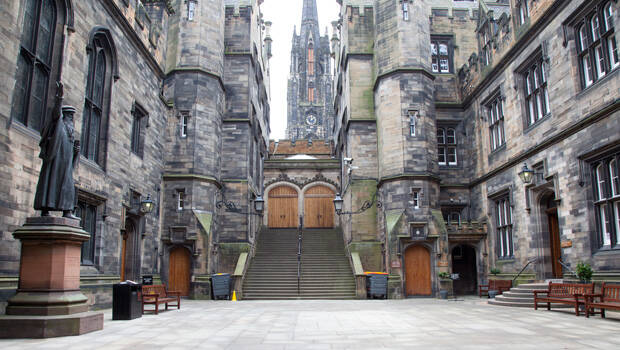Edinburgh—I spent only one day here and so will be content with a brief post. The city is lovely, much larger than St. Andrews and not quite so old. It was laid out in the 19th century, I think, and in most directions there are great vistas, avenues leading to imposing buildings. It is a city of imposing government buildings, including several great castles, but it is proud of its intellectual heritage. There are statues of the economist Adam Smith and the philosopher David Hume, and of John Knox, the fierce Reformer (who might well be dismayed at the progressive learning occurring in Edinburgh today); and a very large and imposing monument to Sir Walter Scott, that prolific and popular novelist of the 19th century.
My destination was New College, which is several hundred years old, and to be distinguished from Old College, several centuries older. New College, which looks out onto the Firth of Forth, is home to the School of Divinity and its distinguished faculty. I had been invited to give a lecture to a gathering of about 75 faculty and students, on interreligious learning after Vatican II, and how my study of Hinduism is a genuinely theological discipline with serious implications for Christian and Catholic theology. I think it went well, judging from the many good and hard questions that were asked.
My host was Joshua Ralston, a young American professor who has recently become lecturer in Muslim-Christian relations in the divinity faculty here, and who works with the faculty in the Centre for the Study of World Christianity. In attendance at the lecture was Alex Chow, lecturer in world Christianity, who also came to dinner afterwards. There were also scholars and students from a number of different countries, including some working in the fields of Judaism, Hinduism and Buddhism, and even a student scholar of the indigenous peoples of northern Scandinavia. I was honored to meet the well-known and now very senior scholar Robin Boyd, former director of the Irish School of Ecumenics, and known for five decades and more for his work on Christianity in India. And so on—an incredible diversity of people and interests in old Edinburgh.
At dinner, Joshua and Alex discussed their work, and I was particularly impressed the scope of their connections with scholars across the United Kingdom and the European Union, and more widely in the Middle East and across Asia and other parts of the globe. Global Christianity is exactly that, a new comprehension of Christianity as not merely Western, nor merely the West plus its former missions and colonies, but rather a truly global phenomenon—East and West, North and South—that is impossible to understand from any single vantage point. There is much, in history and doctrine and practice, that links Christians back to Jesus himself, but no single instance of how that works out is sufficient to predict how Christians will be elsewhere. The study of Muslim-Christian relations is part of a worldwide living network of scholars and practitioners, Muslim and Christian, who work together to improve understanding between these two great communities. We are inundated with reports of Muslim-Christian friction and enmity. Yet deeper, more widespread, and more enduring is a great global web of old and new connections linking Muslims and Christians as never before, in study and work and prayer.
I mention all this detail because it made clear to me—and I hope now to you as well—that interreligious violence and hatred, suspicion, the building of walls and the exclusion of the stranger are truly not the main forces of our time; ignorance is not growing stronger all the time; differences are not becoming insurmountable. Yes, there are terrible problems in our world, and no one should minimize the violence and threats to minorities in certain places; we ought not merely pretend that all is well.
But centuries from now, what I could see happening in Edinburgh—just as in Cambridge and myriad other cities and towns globally—will stand out as a monument to our times. Generations to come will remember our era as a time of an ever-increasing interreligious connectedness. The emergence of a world Christianity is part of this, as Christians of every kind find ourselves deeply and irrevocably drawn into new bonds with each other, now as equals, and with people of other faith communities, large and small. In like manner, differences aside, every other tradition too is redefining itself, event by event, conversation by conversation, classroom by classroom, in relation to religious others who are now becoming religious collaborators, dialogue partners and friends. The clash of civilizations captures the headlines, but the actual reality is that of a growing harmony and understanding that surpasses anything seen on earth up to now.
But now, back to Cambridge and my work at Harvard. I will write soon about the October 14-16 conference at my Center, “Religion, Ecology, And Our Planetary Future.”







